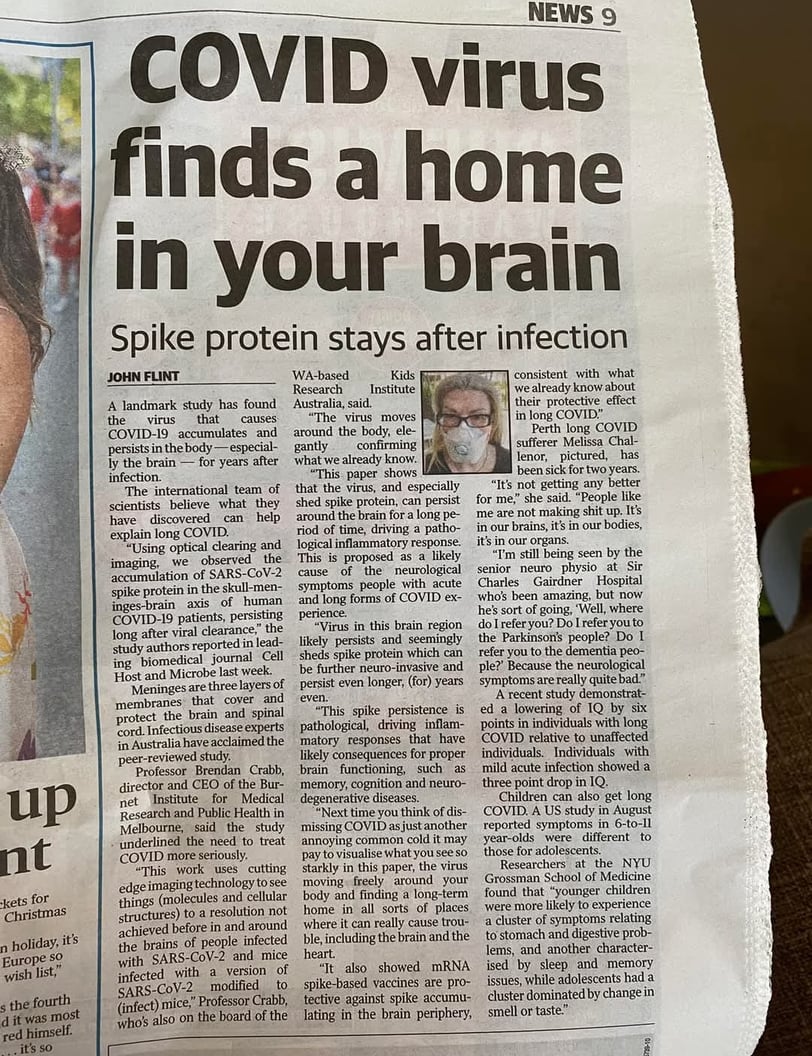AMAZING natural health products backed by research
Impact of SARS-CoV-2 Spike Protein on Brain Health
Recent research reveals how the SARS-CoV-2 spike protein affects brain health, lingering in brain regions after infection and contributing to neurological symptoms such as brain fog and memory loss, potentially explaining long COVID.
BRAIN HEALTHMETABOLIC HEALTHCOVIDCELLULAR HEALTHLONGEVITY
AlexanderJ
12/12/20242 min read


SARS-CoV-2 spike protein found lingering in brain regions
"Spike protein detection in non-COVID-19 deaths: Spike protein was found in 10 out of 34 skull samples from individuals who died of non-COVID-19 causes, suggesting persistence long after infection resolution."
Click here for reviewed article from Cell Host & Microbe
Summary of Findings
Persistence of SARS-CoV-2 Spike Protein in Brain Regions:
The study revealed the SARS-CoV-2 spike protein can persist in the skull marrow, meninges, and brain regions long after active infection has resolved, even when viral RNA is undetectable. This persistence contributes to chronic neurological symptoms, such as brain fog and neurodegenerative changes.
Mechanisms of Damage:
The spike protein crosses the blood-brain barrier (BBB) and interacts with neuronal tissues.
It induces systemic inflammation and neuroinflammation, disrupts endothelial function, and promotes axonal damage.
Proteomic overlap with Alzheimer’s disease suggests potential links between COVID-19 and neurodegeneration.
Vaccine Effects:
mRNA vaccines significantly reduced spike protein levels and associated inflammation, emphasizing their protective role, although they did not entirely eliminate spike protein presence.
Behavioral and Functional Impact:
Mouse models showed that spike protein accumulation exacerbates anxiety-like behaviors, stroke, and traumatic brain injury (TBI) outcomes, suggesting long-term effects on brain health.
Evaluation of Annatto Tocotrienol and GG in COVID-19 Neurological Treatment
Annatto Tocotrienol:
Tocotrienols are potent antioxidants that neutralize oxidative stress, a key factor in COVID-19-associated neuroinflammation.
They are known to cross the BBB, targeting oxidative damage directly in the brain and potentially mitigating neurodegeneration and inflammation caused by lingering spike proteins.
Their role in mitochondrial protection could address spike protein-induced lysosomal activation and axonal damage.
Annatto GG (Geranylgeraniol):
GG plays a critical role in cellular processes such as mitochondrial function and protein synthesis.
While there is less evidence about GG crossing the BBB compared to tocotrienols, GG supports overall cellular resilience, which could indirectly benefit brain health.
Research on GG’s permeability across the BBB and its efficacy in direct neuroprotection is limited but worth exploring.
Observations on the Virus Hiding Behind the BBB
SARS-CoV-2 exploits the BBB to shield its spike protein from immune clearance, prolonging inflammation and damage. This underscores the importance of treatments that can penetrate the BBB, like tocotrienols, to counteract persistent neurological effects.
For those seeking to bolster their defenses, combining annatto tocotrienol with annatto GG offers a comprehensive approach to systemic and brain health.
Visit Natural Health Connect to learn more about these groundbreaking supplements and start your journey to better brain health today. Remember, prevention is always more affordable and effective than treatment.
Suggested Dosages:
For prevention:
one Eannatto 150+ capsule daily with main meal to maximise bio-availability. Each capsule contains 150mg of annatto deltagold tocotrienol plus 75mg of annatto gg-gold together in one convenient capsule.
For treatment:
one 300mg Eannatto DeltaGold tocotrienol vitamin E and one GG-Essential GG-gold capsule containing 150mg of GG daily with meals. If possible, take them at separate meal times for maximum bio-availability, e.g. One with breakfast and the other at dinner.
